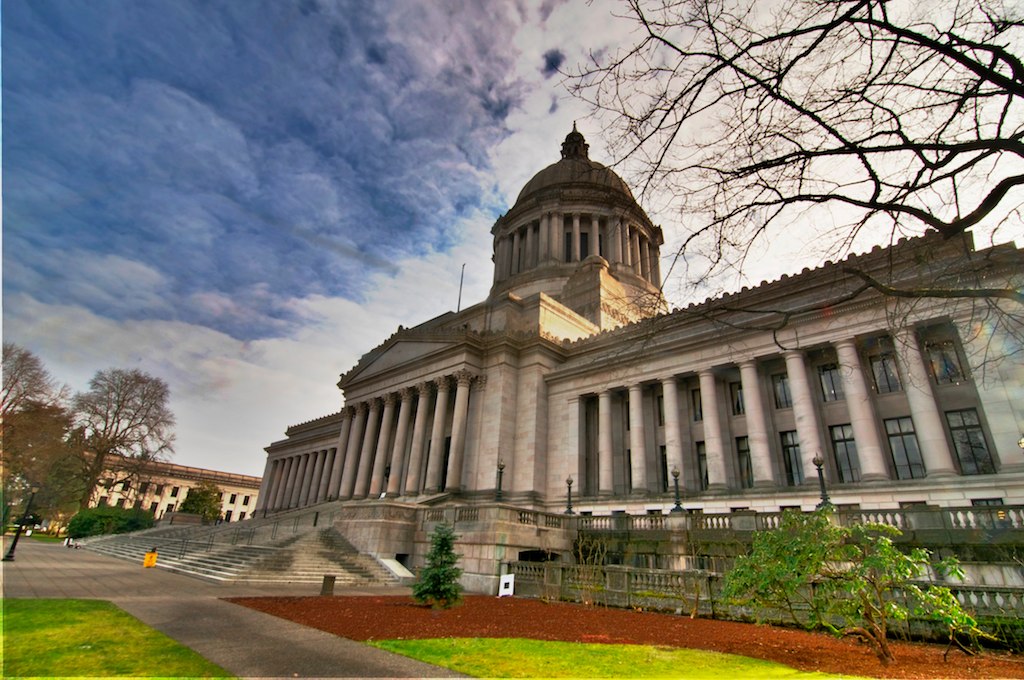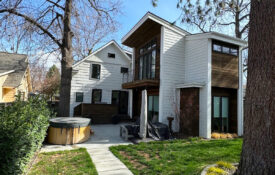In February, I wrote that “Washington has a pioneering opportunity to enact a coordinated package of housing policies that calls on cities throughout the state to share the responsibility.” How’d that pan out?
Though a mixed bag of wins and losses, Washington’s 2019 legislative session was a landmark for housing nonetheless. Not since the state enacted its Growth Management Act a quarter century ago have legislators tangled with such a big stack of bills dealing with growth and affordability.
Impressively, lawmakers passed legislation addressing all three of the key objectives that together create a balanced approach to equitable housing in growing cities:
- more homes of all shapes and sizes to cool average rents and prices
- more funding for subsidized homes to meet the needs of those who can’t afford what the market offers
- more tenant protections to safeguard those with the least housing security—renters—and insulate them from rapid change
The upshot:
For more homes, HB 1923 lays out a set of actions cities can take to accommodate new housing, and SB 5334 fixes liability laws to boost condo construction.
For more funding, HB 1406 enables the use of sales tax and HB 1219 re-authorizes use of real estate excise tax, while the budget raises the housing trust fund allocation to $175 million.
For more tenant protections, HB 1440 lengthens the required notice for rent hikes from 30 to 60 days, and SB 5600 extends from three to 14 days the grace period before the eviction process ensues.
When should the state step in?
The housing bills in Washington’s 2019 session also sparked a pivotal debate: What is the proper balance of local versus state control? When cities stubbornly retain overly restrictive zoning and regulations that thwart new housing and exacerbate a statewide affordability crisis, at what point are state laws justified to level the playing field and make sure all cities share the responsibility?
In California, the housing crisis poster child, state lawmakers are currently pushing several pro-housing bills, including taking a second crack at a sweeping law that would mandate cities statewide to allow more apartments near transit. Meanwhile, Oregon’s legislature is considering a law that would legalize triplexes everywhere—and yes, that includes areas that currently allow only detached houses.
Two Washington bills in particular catalyzed debate over local control of homebuilding. The first—SB 5812, which failed to pass—would have relaxed restrictions on in-law apartments and backyard cottages statewide. Uneasy lawmakers stripped out most of its requirements and added exemptions for most cities, leaving the bill so toothless that proponents pulled their support and let it die. The bill will be back next year.
The second—HB 1923—would have, in its original form, required cities to take policy actions that support more homebuilding. But under pressure from cities and their lobbyists, the bill’s proponents made the actions optional. Even so, the new law is a win for housing abundance because it grants cities new protections from legal appeals when they allow more homes in ways defined in the bill.
Washington is primed to bust bigger moves next year
The 2018 election’s blue wave created the most Democratic Washington legislature in years. But that doesn’t guarantee slam dunks for housing bills, and in fact the 2019 session suggests that bi-partisanship will be the key to success. Some of the strongest resistance to SB 5812 and HB 1923 came from the Democratic side, fueled by concerns over loss of local control.
On the flip side, many Republicans tend to support housing deregulation. A Republican co-sponsored SB 5812, which won the votes of 15 Republican Senators. Republicans saved HB 1923 from an early demise, and in the end it earned the votes of 26 of them, while three Democrats voted against.
Passed or not, these two bills and others (see below) have broken the ice around the idea that state leadership is essential for addressing a home shortage that spans city borders and pushes prices up across communities. The 2019 session also demonstrated the potential for a bigger political tent when the legislature takes up a comprehensive suite of bills for more homes, more funding, and more tenant protections.
Bills rarely pass on the first try, especially with Washington’s part-time legislature and short sessions. Many of the housing bills—especially the more homes ones—were unfamiliar to lawmakers and coalitions take time to form. Pro-housing advocates can look forward to a wider window of opportunity next year. Washington’s 2019 session yielded a huge raft of wins for climate. Is housing next?
Read on for a rundown of the housing bills the Washington legislature considered in 2019. All the passed bills except the budget ones (HB 1102 and HB 1109) have been signed by Governor Inslee.
BILLS FOR MORE HOMES
PASSED: HB 1923—Increase Residential Building Capacity
Representative Joe Fitzgibbon sponsored this bill to spur cities to relax zoning and other regulations that limit new housing. Passing HB 1923 was a major milestone because it trail blazes an expanding future role for the state in addressing the statewide housing shortage. The last time the legislature seriously considered anything similar was 2009’s HB 1490, which would have mandated that cities zone the areas around light rail stations to accommodate a density of 50 homes per acre.
As originally proposed, one part of HB 1923 would have required cities to implement two actions from seven choices intended to increase capacity for new homes. However, responding to concerns raised by city officials about state preemption of local control, legislators revised the language from “require” to “encourage” to get the votes. They also allocated $5.8 million for planning grants to support cities taking actions stipulated by the bill.
What makes HB 1923 a solid win even in its weakened optional form is a provision that protects municipalities from legal appeals under the State Environmental Policy Act (SEPA) when they enact any of the bill’s actions. To highlight the import of the SEPA appeal exemption: if HB 1923 had been in place, Seattle could have avoided the two SEPA appeals that have stalled passage of ADU reform for nearly three years and counting. Such risk reduction is especially helpful to smaller cities that wish to pursue politically challenging rule changes—say, re-legalizing triplexes—but lack the resources to fight lengthy appeals.
HB 1923’s optional actions that are exempt from SEPA appeals include:
- Zone to allow 50 homes per acre around train stations, or 25 homes per acre around bus stops with frequent service
- Adopt a set of liberalized regulations for accessory dwelling units (ADUs)
- Allow duplexes (on corner lots), triplexes, courtyard apartments, “cluster” zoning, or lot size averaging in zones currently restricted to detached houses
- Adopt various forms of growth or housing plans
- Expand exemptions from SEPA review for individual homebuilding projects
- Allow subdivision into the maximum number of lots authorized by state law
- Set a minimum density of six homes per acre in all residential zones
The second part of the bill outright enacts a variety of new rules: it reduces parking quotas for affordable and senior housing near transit; establishes exemptions from legal appeals related to transportation impacts; bans prohibitions on supportive housing; and commissions the University of Washington to produce a housing report every two years. Lastly, one provision stands out for not increasing housing capacity: the addition of an inclusionary zoning requirement to the state’s “Transit Infill Review” planning process.
DIED: SB 5812—Reduce Barriers to Accessory Dwelling Units (ADUs)
SB 5812 didn’t pass, but it did make waves. Representative Mia Gregerson crafted the bill (and, full disclosure, Sightline helped). As introduced, it was the most progressive statewide ADU legislation in the nation, stronger even than the ADU acts approved in recent years in California and Oregon. It would have directed cities to: allow two ADUs per lot (one in-law apartment attached to the main house and one separate backyard cottage); remove off-street parking requirements and owner occupancy requirements; eliminate disproportionate impact and utility fees; and adopt a liberal set of rules for “design standards” such as ADU size and placement on the lot.
Although Washington passed a law permitting ADUs in 1993, many cities impose all manner of restrictions that make it hard for homeowners to build them. Still, SB 5812 alarmed city officials and even some state legislators who believed it went too far in overstepping local control. As the bill wended its way through the legislative process, concerned lawmakers stripped out key requirements and watered down most of the rest. They also added grandfather clauses that let most cities off the hook from doing anything at all. As the session’s end neared, the bill’s champions decided it would be better to let it die and try again next year than to pass a largely meaningless bill. Advocates and legislators will take another shot in 2020.
PASSED: SB 5334—Reform Condominium Liability Law
Senator Jamie Pederson sponsored this bill to fix the state’s condo defect liability law that has helped cause a condo construction drought by encouraging frivolous lawsuits. Rather than try to revamp the whole thing, legislators pursued a bill to improve the existing law around the edges. The main changes are subtle: it tightens what qualifies as a warrantable defect, and more explicitly shields condo association board members from personal liability so they would be less inclined to file lawsuits just to protect themselves. Industry leaders are hopeful, but the impact is difficult to predict. Only time will tell how the courts interpret the new law and, ultimately, if it succeeds in thawing condo construction.
DIED: SB 5769 and SB 5424—Mandate Upzones
Senator Guy Palumbo sponsored both of these bills that pushed the envelope so far that they were dead on arrival. SB 5769 would would have mandated that cities allow “missing middle” homes—duplexes, triplexes, townhouses, and small apartment buildings—on all lots within a quarter-mile of parks, schools, hospitals, transit, and any zone that already allows multifamily housing or commercial uses.
SB 5424 would have would mandated that cities in which Sound Transit locates a station for its ST3 expansion must zone the residential land within a half mile of the station to accommodate 150 homes per gross acre. That’s the density of high-rise buildings, and it’s three times what HB 1923 stipulates (see above).
Though they didn’t go anywhere, both bills opened wider the Overton Window and set expectations higher for next year. By then, California may have passed a transit upzone law and Oregon a missing middle upzone law.
PASSED: SB 5383—Ease restrictions on tiny houses
SB 5383 allows cities and counties to permit “villages” of tiny houses with wheels, and prohibits them from barring tiny houses as primary residences in mobile home communities. Two other tiny house bills, SB 5383 and HB 1206 did not pass. Though their limited numbers won’t ever affect the larger housing market much, tiny houses provide homes that work for some people and every bit helps in a housing shortage.
BILLS FOR MORE FUNDING
PASSED: HB 1406—Redirect sales tax revenue to fund affordable housing
Sponsored by Representative June Robinson, HB 1406 establishes a brand new source of public subsidy for affordable housing—a major accomplishment, as the legislature rarely authorizes new funding sources. Adding to the political hurdle that lawmakers had to clear, the new law allows cities to recapture tax revenue that otherwise went into the state’s general fund—at a time when the state budget is already stretched thin.
HB 1406 enables cities and counties to use 0.01 percent of the sales tax currently authorized by the state for acquiring, rehabilitating, or constructing affordable housing. Municipalities could opt to bond against the future tax revenue to create a bigger chunk of funding near-term. The bill would also authorize local levies for an additional 0.01 percent sales tax to be used for the same purposes.
To give an idea of the potential, in 2017, Seattle generated about $26 billion in taxable sales, from which a 0.01 percent tax would capture $2.6 million per year, or twice that if the city also enacted an additional local levy. Of course, the rest of Washington’s cities have less sales, which would yield less funding.
PASSED: $175 million funding for the State Housing Trust Fund
HB 1102, the capital budget bill, allocates $175 million to the state housing trust fund. Established in 1986, the trust fund has helped affordable housing developers create some 47,000 subsidized homes statewide. In recent years, the state has allocated around $100 million per year to the Trust Fund. In response to the state’s worsening housing crisis, this year advocates lobbied legislators to double the funding to $200 million and got three quarters of the way there.
DIED: SB 5363—Extend the 12-year limit of the multi-family tax exemption (MFTE)
Under state law, cities can grant a property tax exemption on apartment buildings that offer 20 percent of their units at rents affordable to households earning 80 percent of the area median income. Under current rules, the exemption expires 12 years from building completion, at which point the owners can be expected to raise the rents of the no longer subsidized units back to market-rate.
SB 5363 would have extended the expiration for another 12 years to keep the affordable homes available longer. The bill passed in the Senate but current house leadership is not supportive of the MFTE program and failed to move the bill. SB 5366, which would have extended eligibility for MFTE to smaller cities, also did not pass.
The pro-housing non-profit Up for Growth estimates that if the legislature fails to extend the MFTE term, more than 2,000 below-market rental homes will fall out of the program and revert to market-rate by 2022. Legislators will likely take it up again in 2020 when the House is under new leadership.
PASSED: HB 1219—Reauthorize the use of REET for affordable housing
Sponsored by Representative Amy Walen, HB 1219 extends authority that was due to expire for cities to use revenue from a 0.25 percent real estate excise tax (REET) for the construction and rehabilitation of affordable housing and housing for the homeless. Expenditures are capped at 25 percent of the total tax collected or $1 million, whichever is less. That limited level of funding won’t buy many subsidized homes when a single typical apartment costs upwards of $250,000 to build, but any funding helps. SB 5357, a related bill that would have authorized a 0.5 percent REET, did not pass.
DIED: HB 1921 and SB 5582—Make the REET progressive to generate funds for affordable housing
Both bills proposed raising the REET rate for higher priced property sales and using the additional revenue to fund affordable housing. For example, HB 1921 would have changed the state’s current 1.28 percent rate to 0.75 percent for sales less than $500,000, and to 3 percent for sales more than $7 million, and would have authorized cities to dedicate 75 percent of the extra revenue to affordable housing. The legislature did pass another version of a progressive REET, SB 5998, but it does not allocate revenue to affordable housing.
Progressive REETs have one big flaw: apartment building sales will invariably get hit with the highest rate, even though their individual homes tend to be relatively low value. For example, SB 5998 will tax a single-family house that sells for between $1.5 million and $3 million at 1.28 percent. But most apartment buildings sales are more than $3 million and so will pay 3 percent. In other words, the progressive REET penalizes multifamily housing. Next year, state lawmakers can consider improving the REET by setting the tax rate tiers according to the sale price per home in the building. Better yet, they could exempt multifamily housing altogether.
BILLS FOR MORE TENANT PROTECTIONS
PASSED: HB 1440—Require 60 days notice for rent increases
HB 1440 extends the required notice period for any rental increase from 30 days to 60 days and banned rent increases before completion of the lease for most tenancies. A related bill that did not pass, HB 1460, would have extended the notice period to 60 days only for rent increases greater than 10 percent.
In booming, housing short metros such as Seattle, far more people lose their homes through economic displacement—that is, when a tenant can’t afford rent and leaves—than through physical displacement when homes are demolished. HB 1440 will give tenants more time to prepare for rent hikes, which can help them stay in their homes longer.
PASSED: SB 5600—Extend the eviction process
Sponsored by Senator Patty Kuderer, SB 5600 gives tenants more breathing room to catch up on their rent and avoid eviction. Under the outgoing law, when tenants were late paying rent, they had three days to pay after landlords notified them in writing before they become guilty of “unlawful detainment,” which sets in motion the formal eviction process. SB 5600 extends this “pay or vacate” waiting period from three to 14 days. (HB 1453, a bill that proposed similar changes, did not pass.)
When a court orders an eviction, SB 5600 establishes a new grace period of five days during which tenants can reverse the decision if they pay the overdue rent, plus court costs, the landlord’s attorney fees, late fees stipulated by the lease (not exceeding $75), and an additional $50 fee. While this allowance gives tenants more time to settle accounts and stay in their homes, court costs and attorney’s fees could easily rise beyond the financial means of many tenants.
The new law also allows courts to halt an eviction so that landlords and tenants can set up a payment plan and apply for a grant from the state’s Landlord Mitigation fund; expands the definition of “rent” to include utilities; adds guidelines for court-ordered evictions; and bars courts from halting evictions for over 90 days.
DIED: HB 1656—Require just-cause eviction
Sponsored by Representative Nicole Macri, HB 1656 would have prohibited landlords from evicting tenants without “just cause.” Modeled after Seattle’s ordinance, just cause would have been limited to: missed rent or violated the material terms of the lease; the unit deemed uninhabitable; or the landlord planning to improve, demolish, sell, or move into the unit. The bill also would have required landlords to notify tenants of eviction from 14 to 120 days in advance, depending on the cause, and established tenant protections for cases in which landlords violate the just cause rules.
The legislature passed HB 1462, sponsored by Representative Andrew Barkis, which requires landlords to notify tenants 120 days in advance in cases of eviction due to demolition, or rehabilitation. The bill exempts jurisdictions that already require 120 day notice for demolition and have a relocation assistance program. While HB 1462 does not designate “just cause” for eviction, it does provide tenants with proper notice for cases of demolition.
DIED: SB 5441—Extend the early release voucher program
Washington state’s early release voucher program gives temporary subsidies for rent to offenders who qualify for early release from prison. SB 5441 would have authorized an extension of the program from three months to six months.
FAILED: Increase funding for the Housing & Essential Needs (HEN) Program
Washington’s HEN program provides rent and utility payment assistance to extremely low-income people with physical disabilities or mental illnesses. Advocates called on legislators to increase funding to $69 million. The omnibus budget bill, HB 1109, includes a far more modest increase by $14.5 million.









